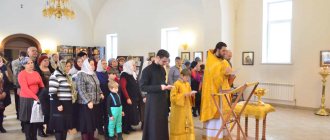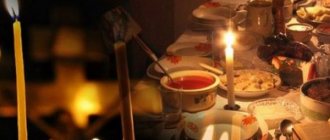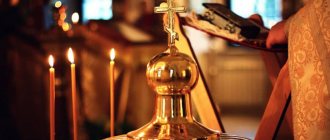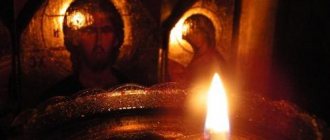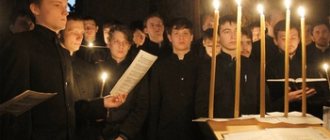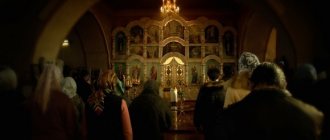Psalms and its meaning
The Book of Psalms belongs to prayer poetry and includes 150 psalms. The Psalms describe various events of the Old Testament, and its authors were King David, Abraham, Moses, Melchizedek and others.
The Psalms can be read both at services and at home. They are also read at funeral services, liturgies, and various services.
Important!
The Holy Resurrection of Christ in 2022 will be on April 19, and St. Thomas Week will be on April 26.
As Gregory of Nyssa says, the psalms are a “guiding hand” for a person who is at a loss, giving peace to the sick. Men and women learn wisdom from them, and for children, reading psalms is fun and joy.
Athanasius the Great claims that reading the psalms leads to repentance, gratitude to God, will relieve sorrow and temptation, and will prompt the answer to any life question.
Constantly reading psalms makes a person spiritually closer to God, he can cope with any troubles that arise in his life.
Krasnaya Gorka, Antipascha, Fomino Sunday
In the Orthodox calendar, this holiday has two names, neither with slides nor with color:
- Fomino Sunday - in honor of the Apostle Thomas, who refused to believe in the resurrection of Christ until he himself appeared before his disciple and allowed him to touch the wounds received on the cross;
- Antipascha - meaning “instead of” Easter, that is, a kind of replacement, continuation of Christ’s Resurrection, which rang with bells and solemn services a week ago.
Well, Krasnye Gorki is a popular name, an echo of that distant time when polytheism reigned in Rus', and every year our ancestors celebrated a great holiday dedicated to the final victory of spring over winter and honoring deceased ancestors. To celebrate this significant date, entire villages of Slavs climbed to elevated places, where they were closer to the gods, and the sun-warmed earth managed to become covered with grass and flowers - that is, to become “red” or beautiful - and performed their ritual rituals and games there.
Krasnye Gorki is a holiday with a very ancient history.
It is not surprising that people’s rumors have long attached great importance to this day, which combines Christian and pagan holidays, and prayers and conspiracies on Krasnaya Gorka are considered to be endowed with special power.
In 2022, Easter will fall on April 28, and Krasnaya Gorka will fall on May 5, that is, exactly the next Sunday.
Days when the Psalter is not read
There are days in the Orthodox calendar when the psalter is not read. In churches and at home, starting from Maundy Thursday and until St. Thomas Week, one should not read the psalms. This period lasts 10 days.
At home, kathisma should be divided into three Glories.
Important!
Kathisma is a special section in the Psalter in which you can sit. There are 20 kathismas.
Before reading the kathisma, you need to read “Our Father...”, after “Lord have mercy” 12 times, and then kneel with prayer.
How to read the Psalter during Lent
Pray for one another (James 5:16).
The Psalter is a sacred book of psalms, or Divine hymns, written down by King David at the inspiration of the Holy Spirit. Reading the Psalter attracts the help of Angels, blots out sins, and saturates the soul with the breath of the Holy Spirit.
The method of praying according to the Psalter is much more ancient than the Jesus Prayer or reading akathists. Before the advent of the Jesus Prayer, in ancient monasticism it was customary to read the Psalter in one’s mind (to oneself) by heart, and some monasteries accepted only those who knew the entire Psalter by heart. In Tsarist Russia, the Psalter was the most widespread book among the population.
In Orthodox ascetic practice, there is still a pious custom of reading the Psalter by agreement, when a group of believers separately from each other reads the entire Psalter in one day. At the same time, everyone reads one kathisma assigned to him at home, privately, and remembers the names of those who pray with him by agreement. The next day, the Psalter is read in its entirety again, with everyone reading the next kathisma. If someone fails to read the kathisma assigned to him one day, it is read the next day plus the next one in order.
So during Lent the entire Psalter is read at least 40 times. One person cannot achieve such a feat.
Tips for beginners
1. To read the Psalter, you must have a burning lamp (or candle) at home. It is customary to pray “without a light” only on the road, outside the home.
2. Psalter, on the advice of Rev. Seraphim of Sarov, it is necessary to read aloud - in an undertone or more quietly, so that not only the mind, but also the ear, listens to the words of the prayer (“Give joy and gladness to my hearing”).
3. Particular attention should be paid to the correct placement of stress in words, because a mistake can change the meaning of words and even entire phrases, and this is a sin.
4. You can read the psalms while sitting (the word “kathisma” translated into Russian means “that which is read while sitting”, in contrast to the word “akathist” - “not sitting”). You need to get up when reading the opening and closing prayers, as well as during the “Glories”.
5. The psalms are read monotonously, without expression, in a slightly chanting manner - dispassionately, because Our sinful feelings are unpleasant to God. Reading psalms and prayers with theatrical expression leads a person to a demonic state of delusion.
6. One should not be discouraged or embarrassed if the meaning of the psalms is not clear. The machine gunner does not always understand how the machine gun fires, but his task is to hit enemies. Regarding the Psalter, there is a statement: “You don’t understand—the demons understand.” As we mature spiritually, the meaning of the psalms will also be revealed.
Prayers before reading kathisma
In the Name of the Father, and the Son, and the Holy Spirit. Amen.
Glory to Thee, our God, glory to Thee! Heavenly King.
Trisagion according to Our Father.
Come, let us worship our King God. Come, let us worship and fall down before Christ, our King God. Come, let us worship and fall down before Christ Himself, our King and our God.
Then another kathisma is read, remembering the names on each “Glory”.
On "Slava"
Where the kathisma is interrupted by the mark “Glory”, the following prayers are read:
Glory to the Father, and the Son, and the Holy Spirit, now and ever and unto ages of ages. Amen.
Hallelujah, hallelujah, hallelujah, glory to You, O God! (3 times).
Lord, have mercy (3 times).
Glory to the Father, and the Son, and the Holy Spirit.
Save, Lord, and have mercy on His Holiness Patriarch Kirill, further - the name of the ruling bishop and the names on the list are remembered, and forgive them all sins, voluntary and involuntary, and with their holy prayers forgive and have mercy on me, unworthy! (After this prayer, you can bow to the ground, depending on the zeal of the believer).
On the first and second “Glory” names of health are remembered, on the third Glory - names of repose: “Rest, O Lord, the souls of Thy servants who have fallen asleep (according to the list) and forgive them all sins, voluntary and involuntary, and grant them Thy Kingdom of Heaven! » (and prostrations).
And now, and forever, and forever and ever. Amen.
And then - the following psalms.
After the third “Glory”, the troparia and prayers written in the next kathisma are read. The prayer “Lord, have mercy” is read 40 times - on the fingers or rosary.
Sometimes, at will, between the second and third tens (between 20 and 21 of the prayer “Lord, have mercy!”), a personal prayer of the believer is said for the closest people, for the most vital.
After reading the kathisma
The closing prayers are also worthy.
Holy Week
Holy Week is the six days of the week before Easter. Starting from Monday and ending on Saturday. The most unfavorable day for all work is Good Friday. On this day, Jesus was taken down from the cross and his body was buried.
During Great Lent, the Psalter is read twice in monasteries, and once in churches - in the morning and in the evening.
The morning service in the temple begins on Saturday and includes the singing of Psalm 17, and the evening service - 1. On Sunday only in the morning are Psalms 2, 3 sung. On Monday morning, Psalms 4, 5, 6, 7, 8 are read, and in the evening 18. On Tuesday, at the morning service, Psalms 9, 10, 11 are read, in the afternoon 12, 13, and in the evening 18. The last day, Wednesday - Psalms 14 - 16 are read in the morning, 19, 20 in the afternoon, 18 at the evening service.
Is it possible to get a haircut before the Ascension?
You can get your hair cut before the Ascension, and after the Ascension, and on any day of the church year when you need it. Another thing is that you should not sacrifice a visit to the temple, preferring an appointment at the hairdresser to the festive service.
The church day begins in the evening, and on Wednesday evening the festive All-Night Vigil is served on Ascension, and on Thursday morning the Liturgy is celebrated. In addition, on the eve of the Ascension, the Easter period ends and on Tuesday evening and Wednesday morning Easter chants are heard for the last time this year.
Hair salons are open every day, and you can find time at a time when most believers are trying to be in church.
Week after Easter
The week after Easter is one of the joyful weeks of the year (along with Christmas). After all, Jesus Christ was resurrected, he conquered death.
Important!
During Bright Week there is no need to read the prayer of Ephraim the Syrian.
During this period, joyful and pious services are performed in churches. And the Orthodox Christian asks the question: when do they begin to read the Psalter after Easter? You can start reading psalms on St. Thomas Week.
The name of the first week after Easter is named after the Apostle Thomas, who was popularly nicknamed “the unbeliever.” The story goes that the apostles were persecuted by the authorities after the death of Jesus, so they did not leave the house. Christ appeared to them in a new hypostasis, as the Risen One. All the disciples believed it. But Thomas was not among them.
Important!
On the days of Bright Week, kathismas are not read.
When the companions of the Christian faith found him and told him about the miraculous resurrection of Jesus, he did not believe it and wanted proof (to touch the wounds on the body of Christ with his hand). On the first resurrection after Easter, the Son of God appeared to the apostles, and when Thomas touched his wounds, when he heard the words that he himself uttered, he believed in the Power of Christ.
Apostle Thomas is a collective image of a person who needs not only blind faith, but also facts.
Thomas Resurrection is also called Antipascha. Don't be afraid of this word. The prefix "anti" does not mean "against", but "instead of". The essence of this day is to repeat to everyone that Christ is Risen! This true idea was celebrated for seven days. After the festive service, the Royal Doors are closed, and the priests begin to read psalms, kathisma and polyeleos.
Therefore, the information about whether it is possible to read the Psalter on Bright Week is correct and unambiguous. The Church allows this.
Ascension - what not to do?
On Ascension, one cannot follow the signs that surround not only church holidays, but the entire church life.
You cannot act guided even by such seemingly “harmless” superstitions, such as, for example, that everything you ask God for on Ascension will definitely come true. Christians believe the words of Christ: “Ask and it will be given to you,” but do not believe that you need to ask at any special time or performing any special rituals. They ask the Lord for help and protection in daily prayers. One cannot approach God as if he were a magician, but by participating in church life and entering the Sacraments of Confession and Communion, a Christian certainly receives support from Him. Ascension is the twelfth (one of the twelve main after Easter) holiday, which always falls on Thursday, and therefore there is no fasting in food on Ascension. At the same time, it is impossible to have a wedding on Ascension or even the day before, since weddings do not happen on major holidays.
Monastic reading of the Undying Psalter
In Orthodoxy there is such a form of prayer as the “Unfailing Psalter” (in monasteries). Every parishioner can order it. This tradition was formed at the turn of the 4th-5th centuries. under the influence of the Monk Alexander in a monastery near the Euphrates River. It received this name due to the continuity of round-the-clock reading.
But do not forget to turn to the Lord yourself and listen to His voice, which also sounds through the lines of the Holy Scriptures. One of the important conditions, without which forgiveness of sins and salvation is impossible, is faith.
Psalter in Russian
In worship, only the Church Slavonic version of this sacred text is used. Despite this, there are translations into modern Russian. To the question: “Is it possible to read the Psalter in Russian?” - priests usually answer something like this: “During a church service, such reading is unacceptable, since, according to Orthodox tradition, church services should be conducted only in Church Slavonic. However, during private readings, the use of Russian-language text is not prohibited.”
There is no specific charter that would regulate how to correctly read the psalter at home. Nevertheless, over the long history of this tradition, certain stable rules have developed that are purely advisory in nature. That is, it is desirable to observe them, but some of them may not be fulfilled due to certain life circumstances.
Advice from priests and holy fathers
The Church does not provide strict regulations on how to read the Psalter correctly at home. But over many centuries, certain rules and conditions have formed in the Orthodox tradition.
- To perform any prayer rule, it is advisable to take a blessing from a priest. You can also get advice on how much time to devote to reading and how often to begin performing this feat of prayer. Perhaps he will recommend reading one chapter at a time or dividing it into a monthly period of time (one and a half kathismas per day), etc.
- You can light a candle or lamp. This will help create a calm, peaceful atmosphere and tune in to prayer.
- If a person fears the negative impact of demons and corruption, it is recommended to read Psalm 90.
- It is better to purchase a collection of psalms with accents placed. Because incorrect accents can distort the meaning of words.
- If it is difficult for a person to stand, reading while sitting is allowed. You need to get up during prayers before the start of kathisma, after the end, and also while reading “Glory”.
- Father Seraphim of Sarov recommended reading in a low voice. This helps to better perceive texts not only with the mind, but also with the ear.
- You shouldn't allow unnecessary emotions. Reading should be smooth, dispassionate and calm.
- Beginners often become discouraged due to the difficulty of understanding the Church Slavonic language. Do not despair, ancient texts have truly unsurpassed beauty and deep meaning that will be revealed over time. In addition, there are interpretations of the Holy Scriptures written by the holy fathers and theologians.
- If you don't have enough time to read, you can at least start listening. There is enough audio material on the Internet. Of course, such a method cannot completely replace living prayer, but there will be benefits for the soul in any case.
- It is advisable to practice not only reading, but also try to learn the texts of the psalms by heart. You can start from the 50th and 90th.
Inscriptions before each Psalm
Psalm captions are not always clear when attempting to establish historical background, authorship, origins, significance, and explanations for the performers. Significant difficulties arise during interpretation, since the Hebrew language, from which the collection of Psalms was translated, is replete with polysemantics, that is, polysemantic words.
In some cases, it was not possible to establish the exact translation of individual words at all. As a result, there are different options. For example, there are significant differences between the Septuagint and the Masoretic text. When compared with Church Slavonic texts, some features can also be noticed. It was in this translation that the indication “Psalm of David” appeared, which was reflected in numerous Russian interpretations, including the Synodal translation.
Genre and guidelines for musicians
https://www.youtube.com/watch?v=fLGfdVBHp8I
Before each song, special instructions have been added to explain the nature of the performance, genre and musical instrument to accompany it.
- Mizmor (etymology - from the root of the Hebrew words “to sing”, song) - it is this word that is translated into Russian as “psalm”. This designation is common to a third of all psalms. They were part of liturgical texts and were performed in the Jerusalem Temple.
- Shigayon is a type of chant implying the pain of loss and unrequited love, as well as a musical instrument. This inscription is found only in the seventh psalm. In the Septuagint and Church Slavonic Bible this song is inscribed “Psalm.” In the Synodal version it is designated as “Lamentary Song”.
- Tefillah literally means “prayer.” Given in five psalms, namely: 16, 85, 89, 101, 141.
- Mikhtam - the root of the word means gold, but there is no explanation. In the Septuagint the interpretation is given as “an inscription on a stone”, in the Church Slavonic version - “writing of pillars”, and in the Synodal version - “Scripture” and “Song”. This inscription precedes Psalms 15, 55, 56, 57, 58, 59.
- Shir - most often used in the phrase “Mizmor shir”, which means “Song”.
- Maqil - the origin of the word originates from the root “sekhel”, which means “mind”, “understanding”. This is exactly the translation given in the Septuagint and the Slavic Bible - “reason”. The Synodal version suggests the indication “teaching”. The meaning of the Hebrew word takes on different shades depending on the context.
- Tegila - translated means “Praise” and is found only in Ps. 144.
Psalms for reading on various occasions (breviary)
All books of Holy Scripture are divided into teaching, historical and prophetic. The collection of psalms is the only section that covers texts of different types: laudatory, repentant, consolatory, grateful, petitionary, etc. This is a kind of biblical prayer book.
The teacher of the Athonite elder Paisius the Holy Mountain, the Monk Arsenios of Cappadocia, used psalms for blessing. He sets out a list of texts with explanations on what occasions it is advisable to reread them.
Unwritten rules
For example, it is recommended to read the Psalter with a lit lamp. But what if a person is traveling and does not have this lighting device at hand? Then this rule can be safely ignored. Because the only rule in this godly work that must always be followed, or at least try to adhere to it, is thoughtful, attentive reading, similar to reading prayers.
Another rule states that it is necessary to try to avoid mistakes in stress when reading Church Slavonic words. It can also be interpreted in two ways. Of course, the clergyman, being a professional, must read the Psalter with minimal distortion of pronunciation norms. But for the common man, the main thing here, again, is not how you read, but whether you read at all. This means that living, sincere prayer is the main goal of reading.
Caring for the dead
Krasnaya Gorka is often confused with Radonitsa. Firstly, due to the proximity of these dates in the calendar - one falls on the first Sunday after Easter week, and the second on the Tuesday following it. And secondly, because of the similarity of celebration traditions. For example, many people prefer to visit the cemetery for cleaning and prayer on Fomino Sunday, although according to church canons the most suitable day for visiting the dead is considered Radonitsa, which also bears the name of parent’s day or Easter of the Dead.
However, there is no serious mistake in this. On St. Thomas Sunday, churches again begin to serve memorial services, which have been absent since Easter, so such an action would be quite logical, especially if you go to the cemetery immediately after the church. At this time, you can clean the graves, mentally communicate with the departed, and light a candle brought from church. And, of course, during Krasnaya Gorka, prayers for the dead will always be appropriate, suitable for a special occasion or general, for the repose of any Christian.
There are prayers common to everyone
For those who want to remember their spouse, there is a separate prayer...
...As for those who have lost their spouse
Many seek consolation in prayer
Our simple words and memories are the best help for the departed.
Understanding the Psalms
The text of the psalms that a beginner reads may initially not be clear to him if the study of holy songs takes place in Latin. Some priests are confident that it is possible to read the Psalter without understanding its meaning, which will be revealed later.
Other experts on holy texts recommend studying ritual chants in Russian and only then proceeding to read the holy book in the original language. In each case, attempts to study kathismas are already considered a good deed and will become a plus in the scale of righteous deeds of any person.
Servants of God recommend communicating with the Creator through prayer every day. They note that it is never too late to come to faith, and inner aspiration is capable of much. A prayer said from the heart will be heard by those for whom it was intended.
